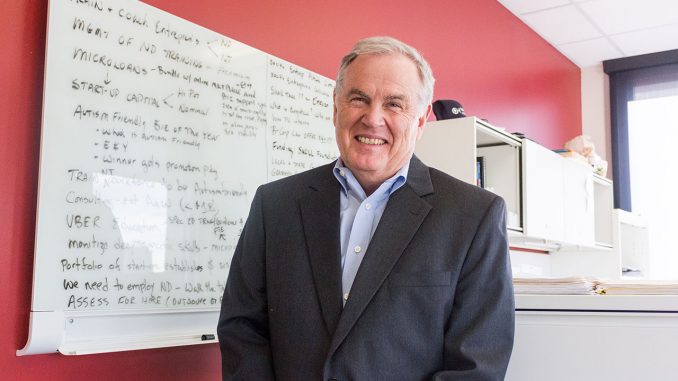
Tom Edwards wondered why his son, who has autism, often had difficulties with his boss at his retail job.
“He’s risen to every challenge successfully, except for employment,” Edwards said. “He hasn’t quite cracked that barrier yet.”
“It finally occurs to me that the way he is being supervised is wrong,” he added.
Edwards, the director of Temple University’s Engineering Management Program, aims to educate business managers and supervisors on empowering employees with developmental and neurological disorders and disabilities including autism, attention deficit hyperactivity disorder and Tourette syndrome. He wrote “Leading Team Members with Super Powers,” a book detailing how to apply effective leadership and management strategies to employees with disabilities.
Approximately one in 59 children in the United States have autism, according to the Centers for Disease Control and Prevention. According to the Bureau of Labor Statistics, less than 22 percent of people with disabilities participate in the labor force.
While researching for his book, Edwards learned many neurodiverse employees struggle with attention to detail and social cognition, which can hinder them in the workplace. Examples include employees becoming frustrated when tasks change, or not understanding how their role benefits a company’s larger goal.
“They’ve got these deep specific skills which can be valuable to a business, but they don’t get the social gist of what goes on around them,” Edwards said.
Neurodiversities include variations in neurological function caused by disorders like autism and attention deficit hyperactivity disorder, according to the Autism Awareness Centre Inc.
The book hasn’t yet published, and Edwards has raised about $400 toward his $3,500 goal to cover the self-publishing costs with an online Kickstarter crowdsourcing campaign.
In 2014, Edwards piloted a leadership workshop at Via of the Lehigh Valley, a nonprofit service for people with disabilities, that focused on leadership skills like inspiring, motivating, delegating and taking responsibility. But Edwards decided he wanted to make a larger impact and started focusing on his book to appeal to a broader audience.
In the book, Edwards encourages managers to change leadership approaches to better connect with employees with neurodiversities. He said these employees can experience anxiety or reduced commitment levels when employers present future goals to accomplish. Instead, Edwards encourages businesses to coach and help people with disabilities work through individual challenges.
Aaron Spector, the director of Disability Resources and Services, said these strategies help employees with neurodiversities succeed through on-the-job individualized training and achievable workflow modifications.
“If it’s something that’s acknowledged, a good job may be able to be restructured and the expectation reframed a little bit so that it’s not too much of an obstacle,” Spector said.
Jonathon Atiencia, a freshman film and media arts major, identifies as a person with a learning disability, and said it affects his writing. Atiencia works as a coach at Temple’s Leadership & Career Studies certificate program in the Institute on Disabilities.
He said he’s achieved success by working closely with his managers and discussing difficulties he faces at work, and these practices could help other employees with disabilities.
“If [employers] give them a second chance, it would help them with their disabilities, and with their lives,” Atiencia added.
For Spector, success for employees with neurodiversities comes from employers valuing the diversity these workers bring to the workplace.
Edwards also teaches graduate students about these topics and techniques, and said they show high interest in wanting to better understand their peers who have disabilities.
Pradipti Pal, a 2017 computer science master’s alumna, took Edwards’s engineering management course in Fall 2017. She uses management strategies she learned from Edwards, like emphasizing communication, in her work as a cloud engineer at San Francisco-based human resources company SAP SuccessFactors. She started with the company as an autism-at-work program mentor.
Pal said she often sees people tiptoe around discussing neurodiversity inclusion in the workplace, and that it’s difficult to see talented people with disabilities go unemployed.
“If you can understand how they bring a competitive advantage to your team, it’s better not just for your employees, but for your manager as well,” Pal said.
Edwards said his book is for anyone interested in becoming a leader.
“‘Neurodiverse’ and ‘neurotypical’ don’t really matter,” Edwards said. “A leader’s job is to find a way for everybody to contribute and fit in.”



How do I get this book. Thank you